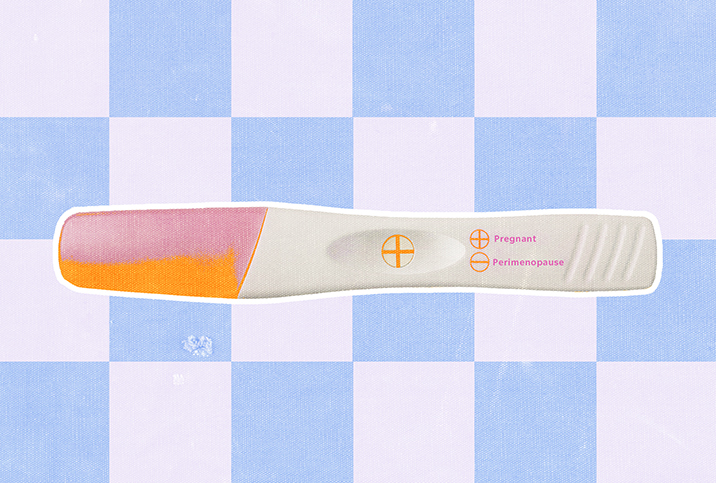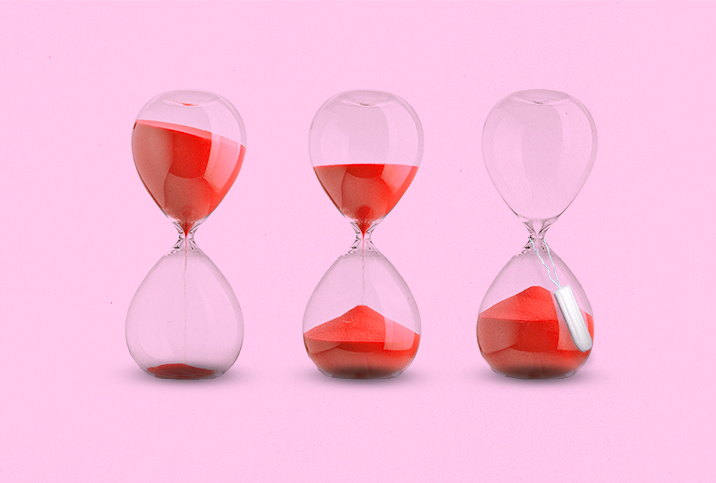Can I Become Pregnant in Perimenopause?

Perimenopause is one of those life stages we've all heard of, but how much do you really know about it? When it happens, why it happens or even what exactly happens: These are all questions that swirl around perimenopause. And one of the biggest questions of all remains: Is it possible to become pregnant in perimenopause?
Chances are most people would answer, "No." After all, the menopausal transition kick-starts a gradual decline in fertility. But the idea that you can't get pregnant in perimenopause is a myth. We've got no time for myths about sexual health, so here's everything you need to know about the possibility of getting pregnant during perimenopause.
What exactly is perimenopause?
"Perimenopause is the few years leading up to menopause when menopausal symptoms start to creep in," said Staci Tanouye, M.D., a board-certified OB-GYN and Poise partner from Jacksonville Beach, Florida. "Normal hormone changes cause irregular menstruation and estrogen fluctuations, which can lead to heavy or missed periods, spotting, hot flashes, night sweats or mood changes."
Alyssa Dweck, M.S., M.D., a gynecologist in New York and spokesperson for the feminine care brand Intimina, offered more details on how perimenopause fits into the menopausal time of life.
"For context, menopause, a natural stage of life which every person with ovaries will eventually go through, is defined as 12 continuous months without menstruation after the age of 40 for no other reason," Dweck said.
"Menopause signifies the end of natural fertility, when ovulation no longer occurs and estrogen levels decline," Dweck continued. "Perimenopause refers to the four to eight or even 10 years leading up to menopause."
"Each woman is different, as such, perimenopause will occur at different ages," said Kecia Gaither, M.D., M.P.H., director of perinatal services/maternal-fetal Medicine at NYC Health + Hospitals/Lincoln in the Bronx, New York. "However, in general, perimenopause typically begins for a woman in her 40s. This transition period again varies from woman to woman, from months in some to a decade or so in others."
Tanouye added that while the onset of perimenopausal symptoms typically start during a woman's mid-40s, they can start as early as her late 30s.
How likely is pregnancy during perimenopause?
The big question: Can you get pregnant during perimenopause?
"The actual age you reach perimenopause is an important factor in your fertility as your eggs diminish in quality as you age," said Monte Swarup, M.D., a board-certified OB-GYN in Arizona and founder of Vaginal Health Hub.
"The odds of becoming pregnant while in perimenopause significantly decreases, but also even more the older you are," Swarup said. "Your ovaries stop working as efficiently as when you were younger. Your estrogen and progesterone levels go up and down, which makes it more difficult to get pregnant."
It's difficult, yes, but it's by no means impossible.
"If someone is still menstruating, that means they are likely still ovulating," Tanouye said. "Fertility doesn't stop during perimenopause until a woman has gone a full year without a period, marking menopause.
"While fertility does decrease with age, that doesn't mean that pregnancy is not possible once you experience perimenopausal symptoms," Tanouye concluded. "Natural conception is possible for women up until menopause, of which the average age is 51."
All of which means precautions against pregnancy still need to be taken.
"Contraception is needed until menopause if pregnancy is potential and undesirable," Dweck said.
Are there risks with pregnancy during perimenopause?
If pregnancy is possible, the next question is "Are there any risks?" In short: yes.
"Pregnancy during perimenopause or over the age of 35 is considered an advanced age pregnancy which has risks," Swarup said. "The older the mother, [the more there is] an increased chance of preterm delivery. Preterm babies have health issues, including learning and behavior issues. Advanced age pregnancy also increases the risk of potential strokes, seizures, gestational diabetes, preeclampsia [and] high blood pressure in the mother."
"We have all heard of successful pregnancies with healthy moms and babies later in life, but this is not the rule," Dweck continued. "Chromosome abnormalities, including Down syndrome, are more common."
Tanouye said the biggest risk from pregnancy during perimenopause is miscarriage.
"This risk increases with age because of declining egg quality and the increase in genetic abnormalities," she explained.
How can I avoid pregnancy during perimenopause?
Of course, you may be trying to get pregnant during perimenopause.
"The best thing you can do to improve your chances is to be as healthy as possible," Swarup said. "Get plenty of sleep, eat healthy and exercise regularly."
But if you have no desire to get pregnant during this time, contraception is your best bet.
"The most common myth is that contraception is no longer needed during perimenopause," Dweck said. "In addition, many don't believe the pill can be used during this life stage, when in fact, it's quite beneficial and desirable in the right candidates.
"Common contraceptive measures during perimenopause are similar to those during other life stages, with some caveats," Dweck added. "[The pill] is especially useful for those needing contraception who are also desiring cycle control for common menstrual irregularities during perimenopause."
Are there other myths about perimenopause?
"One of the biggest myths about perimenopause is that you need to get your hormones checked to find a solution," Tanouye said. "In reality, it's pretty rare that we need to check sex hormone levels. Often, a good history and exam can point to perimenopause if that is the case. There are many ways we can address [perimenopause], but expensive hormonal checking or specially compounded hormones are often not the answer."
Tanouye continued: "Just like some mistakenly believe that you can't get pregnant during perimenopause, others might believe that it's easy to get pregnant during this time due to publicity around celebrities having babies at older and older ages. The truth is somewhere in between. While it's harder to get pregnant during this time, it's still possible, but miscarriage is also much more likely."
As always, it's important to check with a healthcare professional if you're the slightest bit unsure or concerned about anything to do with perimenopause, pregnancy or contraception.
"If you are experiencing abnormal bleeding during perimenopause, talk with your healthcare provider," Swarup said.
Dweck emphasized the importance of using condoms for STI protection as well as contraception if you're having sex during perimenopause.
"We see so many reenter the dating world without taking this precaution," she explained.
For optimal sexual health, it's vital to dispel the myths, pregnancy-related and all, surrounding perimenopause.


















